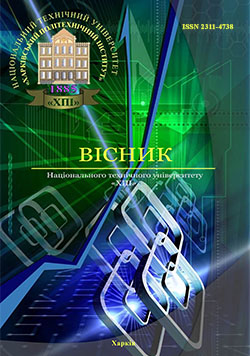MODEL AND METHOD FOR SYNTHESIS OF PROJECT MANAGEMENT METHODOLOGY WITH FUZZY INPUT DATA
DOI:
https://doi.org/10.20998/2413-3000.2016.1173.2Keywords:
project management methodology, Fuzzy multiple criteria decision making, synthesis method.Abstract
Literature analysis concerning the selection or creation a project management methodology is performed. Creating a "complete" methodology is proposed which can be applied to managing projects with any complexity, various degrees of responsibility for results and different predictability of the requirements. For the formation of a "complete" methodology, it is proposed to take the PMBOK standard as the basis, which would be supplemented by processes of the most demanding plan driven and flexible Agile Methodologies. For each knowledge area of the PMBOK standard, The following groups of processes should be provided: initiation, planning, execution, reporting, and forecasting, controlling, analysis, decision making and closing. The method for generating a methodology for the specific project is presented. The multiple criteria mathematical model and method aredeveloped for the synthesis of methodology when initial data about the project and its environment are fuzzy.References
Ilas, M. E., Ionescu, S &. Ilas, C. (2011). Selecting the appropriate project management process for R&D projects in microelectronics. U.P.B. Sci. Bull. Series C. Vol. 73. Iss. 1. 105–116.
Spundak, M. (2013). Mixed agile/traditional project management methodology – reality or illusion? 27th IPMA (International Project Management Association), World Congress, Dubrovnik, Croatia. Procedia – Social and Behavioral Sciences.Vol. 119. 19 March 2014. 939–948 http://dx.doi.org/10.1016/j.sbspro.2014.03.105" target="doilink">doi:10.1016/j.sbspro.2014.03.105
Il'ina, O. N. (2011). Metodologija upravlenija proektami: stanovlenie, sovremennoe sostojanie i razvitie [Project Management Methodology: formation, current status and development]. Moscow : INFRA-M : Vuzovskij uchebnik, 208 [in Russian].
Charvat, J. (2003). Project Management Methodologies: Selecting, Implementing, and Supporting Methodologies and Processes for Projects. John Wiley & Sons, INC, 264.
Cheema, A. & Arshad, A. A. (2005). Customizing project management methodology. 9th International Multitopic Conference, IEEE INMIC, Karachi, 1–6. doi:10.1109/INMIC.2005.334390
Kononenko, I. & Kharazii, A. (2014). The methods of selection of the project management methodology. International Journal of Computing,. Vol. 13, 4, 240–247.
Kononenko, I. V. & Aghaee, A. (2015). Syntez metodolohyy dlia upravlenyia proektom. [Synthesis of methodology for project management] Upravlinnia proektamy: stan ta perspektyvy: materialy ХІ Mizhnarodnoi naukovo-praktychnoi konferentsii. – Project Management: Status and Prospects: Materials of XI International scientific-practical conference. – Mykolaiv: NUK, 73-74 [in Russian].
Raskin, L. G. & Seraja, O. V. (2008). Nechetkaja matematika. Osnovy teorii. Prilozhenija [Fuzzy Mathematics. Fundamentals of the theory. Applications]. Kharkiv : Parus, 352 [in Russian].
Leonenkov, A. (2005). Nechetkoe modelirovanie v srede Matlab i fuzzyTECH. [Fuzzy modeling in Matlab and fuzzyTECH] SPb. : BHV-Peterburg, 736 [in Russian].
Mihalevich, V. S. & Volkovich, V.L. (1982). Vychislitel'nye metody issledovanija i proektirovanija slozhnyh system. [Computational methods of complex systems research and design]. Moscow : Nauka, 286 [in Russian].
Ibragimov, V. A. (2009). Jelementy nechetkoj matematiki. [Elements of fuzzy mathematics]. Azerbajdzhanskaja gosud. neftjanaja akademija Baku, 391 [in Russian].
Haptahaeva, N. B., Dambaeva, S. V. & Ajusheeva N. N. (2004). Vvedenie v teoriju nechetkih mnozhestv [Introduction to the theory of fuzzy sets]. Ulan-Udje, Izdatel'stvo VSGTU, 68 [in Russian].
Pavlov, A. N. & Sokolov, B. V. (2006) Prinjatie reshenij v uslovijah nechetkoj informacii [Decision making under fuzzy information] SPb. : GUAP, 72 [in Russian].
Downloads
Published
Issue
Section
License
Copyright (c) 2016 Igor V. KONONENKO, Ahmad AGHAEE

This work is licensed under a Creative Commons Attribution-NonCommercial-ShareAlike 4.0 International License.
Our journal abides by the Creative Commons copyright rights and permissions for open access journals.
Authors who publish with this journal agree to the following terms:
Authors hold the copyright without restrictions and grant the journal right of first publication with the work simultaneously licensed under a Creative Commons Attribution-NonCommercial-ShareAlike 4.0 International License (CC BY-NC-SA 4.0) that allows others to share the work with an acknowledgement of the work's authorship and initial publication in this journal.
Authors are able to enter into separate, additional contractual arrangements for the non-commercial and non-exclusive distribution of the journal's published version of the work (e.g., post it to an institutional repository or publish it in a book), with an acknowledgement of its initial publication in this journal.
Authors are permitted and encouraged to post their published work online (e.g., in institutional repositories or on their website) as it can lead to productive exchanges, as well as earlier and greater citation of published work.

